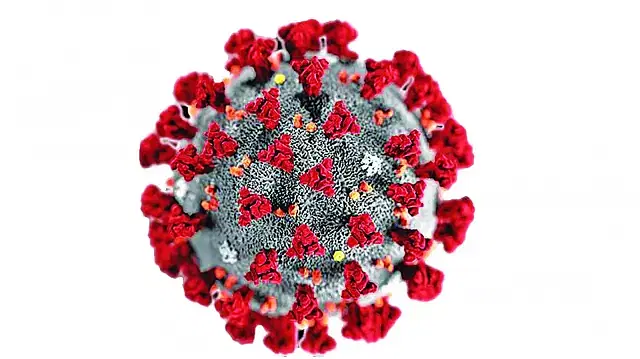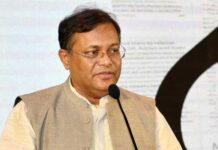
Activities aimed at controlling the COVID-19 pandemic have been stalled considerably due to the clash between the health ministry and the Directorate General Health Services (DGHS). With Eid-ul-Azha just round the corner, there is much to be done to keep the spread of the virus under control. But many important tasks are on hold and experts see this as a dangerous situation.
The first COVID-19 death in the country was reported on 18 March and now, four months on, the death toll stands at over 2500. No effective measures are being taken to reduce the number of deaths. This is an apparent lack of activity in this regard. The World Health Organisation (WHO) has said that COVID-19 transmission has worsened in countries which have relaxed their measures against the virus.
Public health expert and member of the health directorate’s public health advisory committee, Abu Jamil Faisal, told Prothom Alo, “Four or five months after the outbreak of the pandemic, our position should have been strong, but that has not been so. The pandemic is not under control because of administrative mismanagement.”
This situation has had an impact on tackling the spread of the virus. Experts have finalised the lockdown strategy paper and technical directives, but the health directorate has not sent these to the field. Coronavirus sample testing has not been increased due to administrative mismanagement. In proportion to the population, around 24,000 to 25,000 samples should be tested daily. Now, however, only 13,000 samples are tested daily on average.
The public health experts had recommended the use of life-saving high-flow oxygen cannula and a decision was even taken for procurement. But even that decision has been pushed back. There are many other such instances which have now brought things almost to a standstill.
Speaking to Prothom Alo on Friday, secretary of DGHS’s health services division, Abdul Mannan, said that things have not come quite to a standstill, but a degree of unrest prevails. We are trying to make a big jump for change, he said, adding that the technical committee will have a meeting on Monday. He hopes an important decision will be taken then.
The world was not prepared for coronavirus when it broke out, but Bangladesh did have the time to prepare. The health ministry and the government even declared that they were prepared. But it is now apparent that there were gaping lapses in the preparation and these still exist.
Even before beginning to grapple with the magnitude and complications of the virus as well as its impact of business and economy, ministers were airily declaring, “We are stronger than the virus,” “We have less cases and deaths than the US,” and so on.
War-time preparation needs to be taken to tackle the situation. This relaxed attitude must be changed. If necessary, the prime minister must take charge to take the overall work ahead.
At the DGHS conference room on 3 March, the health minister Zahid Maleque had said that they were prepared to tackle coronavirus. A ‘national preparedness and response plan for COVID-19, Bangladesh’ was supposed to have been finalised that day during discussion with representatives of various ministries including the health, the local government, the public administration, and the information ministries. But journalists were asked into the conference room before any discussion even began on the plan and the discussion eventually didn’t take place.
The Communicable Disease Control (CDC) division of the DGHS, the Institute of Epidemiology, Disease Control and Research (IEDCR) and WHO had drawn up a national paper. Under this plan, 11 committees were supposed to have been formed. These committee were formed, but on paper only. Of these, eight committees have not held a single meeting. A report in Prothom Alo revealed this among other discrepancies.
In the fifth edition of the national paper, the number of committees was reduced and the name of the DG DGHS, Abul Kalam Azad, was printed on the cover of the document. The WHO logo was removed.
Another series of discrepancies followed. If the health directorate formed a committee, a parallel one was formed by the health ministry. The health directorate formed an 8-member public health advisory committee. Within a couple of the days, the ministry formed the national technical advisory committee. Alongside the DGHS press briefing, two officials of the ministry call newspersons and brief them. An official of the ministry has even left his office room in the secretariat and now sits in an office room at the new Mohakhali building of DGHS.
At a juncture when coordination between the ministry and the directorate is essential, dissension has broken out between them. At one point of time, the health secretary Asadul Islam was transferred.
Allegations of corruption are nothing new in the health ministry and the health directorate. Transparency International, Bangladesh (TIB) had conducted a survey on corruption in the country’s health sector. TIB executive director Iftekharuzzaman last week told Prothom Alo that the JKG or Regent corruption were just the tip of the iceberg. The health sector corruption was much deeper and extensive. Such corruption was not possible without involvement of the officials.
There has been more irregularities and corruption during the pandemic. The first complaints came from the physicians. A section of the physicians said that they were told to perform their duties without personal protective equipment (PPE). Another section said that the PPE was of poor quality. DGHS did not look into the allegations. Yet in two surveys conducted two months apart by BRAC’s James P Grant School of Public Health, it was seen that both the allegations were true.
Meanwhile investigations regarding corruption in the procurement of N-95 masks, proved that allegations in this connection were true too. There have also been allegations of corruption against certain officers in connection with the Tk 17 billion project funded by the World Bank and the Asian Development Bank.
DGHS recently cancelled the permission given to five establishments to carry out coronavirus sample testing. The directorate had issued the permission without even inspecting the premises. An official of the directorate, on condition of anonymity, said, “So much is being said about JKG and Regent, why is nothing been said about these five establishments?”
Neither the health ministry nor the health directorate has taken any initiative to control the corruption. There are hardly any instances where they themselves have taken measures to prevent corruption or to take punitive action against those who have been guilty of corruption.
Public health expert Mushtaq Hossain said that work on controlling the virus has almost come to a standstill. A section of people feel that coronavirus is not an important agenda of the government and so they too have become careless. Washing hands with soap and water, wearing masks and maintaining social distance has lot importance among the people.
No answers
The government and the people may be relaxed because the number of coronavirus cases and deaths is less compared to the size of the population. When the disease broke out in China, the people were shocked. Fear crept in when there were so many deaths in Italy and other places of Europe. Panic grew when the first death took place in the country. But experts feel the fear has waned.
A top level public health expert, on condition of anonymity, told Prothom Alo, it is not known why the rate of transmission and death is less in the country. While there have been more cases over the past two weeks, it has stabilsed somewhat. The rate of death has also levelled to an extent.
Public health experts see several possible reasons for the situation: the genetic makeup of the people of this region, immunity grown due to food habits, the climate of the region and so on. A leading microbiologist of the country has said, “There must be some reason, but that has to be discovered through research.”
There are many such questions that remain unanswered. IEDCR and iccdr,b are jointly carrying out a research on coronavirus. Initial results of the survey indicate that people living in the slums have been relatively less infected by the virus. However, there is no answer as yet as to why this is so. The results of the survey may be released at the end of this month.
Change needed
The health directorate has failed to provide explanation on certain matters. The general people do not know what recommendations were made by the two expert committees to bring the virus under control and also how many of the recommendations have been carried out.
Public health expert Abu Faisal Jamil has said, “Eid-ul-Azha is ahead. We have given the health directorate specific recommendations in this regard. However, we have no idea whether when these will be carried out, how these will be carried out or whether these will be carried out at all.”
The public health advisory committee had even recommended a curfew to be clamped down before Eid-ul-Fitr. But restrictions had been relaxed during that Eid, people had gone to their villages from Dhaka and spread of the virus increased rapidly. There are fears that this will be repeated during the coming Eid.
IEDCR adviser Mushtaq Hossain does not think that the virus transmission can be kept in control if things continue as present. He said, “War-time preparation needs to be taken to tackle the situation. This relaxed attitude must be changed. If necessary, the prime minister must take charge to take the overall work ahead.”
* This report appeared in the print and online editions of Prothom Alo and has been rewritten in English by Ayesha Kabir









